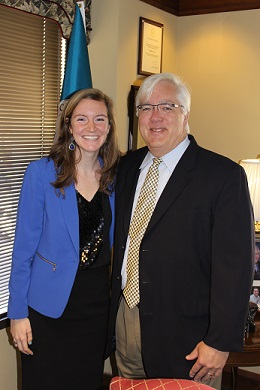
| July 2015, Vol. 9, No. 7 | Past issues | Subscribe | Printer Friendly | Advertise | eMagazine Archives |
Berry College Student Charlotte Collins Interns with the Cobb County BOC (Collins pictured below with Cobb County Chairman Tim Lee) 
Charlotte Collins, a political science major at Berry College, interned with the Cobb County Board of Commissioners as part of the 2014 Fall Georgia County Internship Program. Prior to the internship, Collins was familiar with county government in the sense of the services they offered, but was unfamiliar with the bureaucratic structure, the functions of certain departments or the scope of work performed by county employees.
Over the course of her internship, Collins learned about a host of factors that contribute to county government ranging from administrative tasks and internal politics, to public hearings and the influence of citizen expectations. Through her experience, she was given insight into the workload of Cobb County’s elected officials, as well as the necessity of a strong staff support team to address all issues that can arise in county government.
Collins’ major responsibilities during her internship were to learn about certain county projects and initiatives, to stay updated on their progress, and then report back to the chairman of the Board of Commissioners with meeting summaries and talking points prepared for upcoming meetings. These projects and initiatives specifically included SPLOST, transportation projects with the Atlanta Regional Commission, Water Authority, and Cobb’s Sister City relationship.
The most significant accomplishment for Collins was planning Cobb’s Sister City delegation visit from Seongdong-gu, Seoul, South Korea. This task required months of planning, meetings and budgeting. She was with the Korean delegation during the entirety of their four-day stay in Cobb County. Collins was thankful for the opportunity to be project leader and to have learned so much about project management, as well as a foreign culture.
When asked about her favorite part of the internship, Collins responded it was the variety of experiences that she had gained. Each day of the internship was different and always brought in a challenge. She was constantly surrounded by professionals with a strong work ethic and was always afforded the opportunity to ask for assistance when needed. The internship also provided Collins with an opportunity to learn hand's on about the dynamic of politics on a daily basis, which was more than her political science degree could provide. Additionally, she was able to expand her network of people exponentially due to the exposure from the internship.
In terms of the skills gained from her time with Cobb County, Collins noted that all of the experiences she had in her internship will prove extremely beneficial in helping her to meet future career goals. She further stated that she has gained invaluable knowledge of working in local government. Collins was able to see firsthand the influence of citizens, the media and the overall environment of politics at the county level. Through the internship, she gained specific skills in project coordinating and management, and she strengthened her writing skills through preparing summaries, letters and talking points. Collins’ exposure to meetings and working on various projects allowed her to see the variety of issues that encompasses county government. It further allowed her to learn and work with completely new projects and economic expansion opportunities, such as the Braves coming to Cobb County.
When asked about Collin’s future plans, she indicated that based on her internship experience she would definitely consider a career in county government. She believes that Cobb County’s employees embody professionalism and expertise in their field and she feels honored to have been a part of such a great team.
For more information on the GCIP, please visit the ACCG Civic Affairs Foundation website at www.civicaffairs.org.
Get Your Tax Facts Here
Over the past year, the Georgia Department of Revenue streamlined and revised their website to better showcase the wealth of information that is contained therein. Aside from general tax information, the Department has a special webpage dedicated to local government services located at http://dor.georgia.gov/local-government-services. This webpage provides in-depth information that can assist counties with data requests, tax submission requirements and related materials, training information and opportunities, and tax policies and procedures.
The Local Government Division Services webpage provides detailed information on sales tax distributions, digest requirements, public utilities return forms, unclaimed property, and online and training opportunities. Need to review sales tax distributions for your county for the past three years? Searching for tax digest submission forms? Want to compare your digest values with neighboring counties? Looking for a training class for your appraisal staff? You can find all that and more through this webpage.
The Digest Compliance Section provides values for timber, conservation use, and forestland properties, as well as training and certification programs for taxing officials and staff, digest submission packages, appraisal procedure manuals, information on rollback rates and ad valorem taxes levied, and the county digest review process.
Property tax facts are listed for all 159 counties, which includes the type of homestead exemptions available, whether Freeport exemptions are given and, if so, at what percentage, ad valorem tax payment deadlines, motor vehicle registration information, mobile home taxation guidelines, taxing officials contact information, and general tax, refund, and appeal requirements. This information is provided directly by the tax commissioner of each county and should be updated annually. These facts can be helpful if your county is looking to modify its tax policy or if you want to adopt a new homestead exemption and would like examples as to what type of exemptions are being offered by other counties. These facts are also used by businesses when deciding where to locate as well as taxpayers in deciding where to move, so it is very important that this information is kept up-to-date.
Aside from the property tax facts provided by each county, the webpage also provides detailed digest information through the tax digest consolidated summaries. These summaries depict the assessed totals of all property listed on a county's tax digest separated by tax district. Millage rates for each taxing jurisdiction are also available by year.
The Sales Tax Distribution Section provides sales tax rate, distribution, submission and compliance information. One section is dedicated to sales tax information for taxing authorities. This section contains applicable forms, sales tax commodity reports and commodity codes, information bulletins, submission guidelines, frequently asked questions and sales tax distribution rates for cities and counties.
Detailed information is provided about sales tax rates from a historical chart that provides the start and end date for every sales tax adopted by each county to a monthly rate chart that shows the breakout of counties that have a TSPLOST, SPLOST, LOST, HOST or ELOST. Aside from the types of sales tax collected by each county, an online database is also available that will allow the user to access local sales tax distributions by taxing jurisdiction and by time period. This feature located at https://gtc.dor.ga.gov further allows the user to access all sales tax information for all counties on a month-by-month basis. The webpage also provides periodic sales tax information for specific services. Sales tax rates for energy sold to manufacturers is available for each quarter and prepaid wireless yearly distributions are made available each October.
Another point of interest for counties, beyond the local government services webpage, are the yearly reports that the Department of Revenue publishes that provide in-depth information on both state and local government tax information. The statistical reports provide specific tax information relating to counties, including assessed property values of the gross general, net general, and public utility digests; sales tax distributions by county, and the property tax millage rate by county. The purpose of the property tax administration annual report is to provide the General Assembly with information on the uniformity of valuations between the counties and the fiscal impact on counties related to preferential assessment and conservation use assessment legislation. All Department publications can be found at http://dor.georgia.gov/publications.
The Local Government Services Section of the Department of Revenue’s website is a great resource for county governments to use when seeking information about local government taxes. For more information on local government services information provided by the Department of Revenue, please visit their webpage at http://dor.georgia.gov/local-government-services.
|
| ACCG, Georgia's County Association 191 Peachtree Street NE, Suite 700 Atlanta, GA 30303 phone: 404-522-5022 | fax: 404-525-2477 | ACCG.org |

